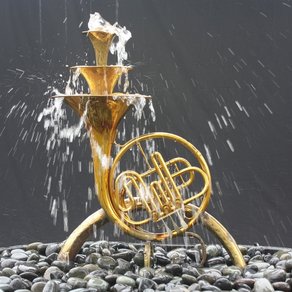Just like with woodwinds we always see lots of “closet / attic” brass instruments coming in to the shop this time of year. We’re all looking to save a little money wherever we can so when it comes to a child starting band why not get out the old trumpet or trombone from our high school days and have it fixed up for our son or daughter to play?! What could possibly go wrong??!
Of course – it’s true that brass instruments are typically a little more resilient than woodwinds. Brass by nature doesn’t degrade the way that wood bodies or felt pads do. With that said the biggest factor that effects whether or not an old brass instrument will be usable is whether or not it was properly cleaned and dried before storage.
Here are some tips on what to look for in an old brass instrument:
– For piston instruments – first off, pull out the pistons! Are they still smooth and uniform in color and texture? If not are there small pits or large areas of plating missing on the surface of the valve? If so unless the instrument is a pro-level specimen or a particularly rare (i.e. valuable) horn then the instrument would likely be better off as a lamp! The cost for performing a “valve job” (i.e. stripping, re-plating and honing the pistons to factory specifications) is typically around $300.00. That does not include any other work – pulling stuck slides, chemically cleaning, dent work, soldering, etc. This will likely place the repair cost beyond the value of the instrument
– If the pistons are OK then it’s time to check for dezincification – more affectionately known as “red rot”. This will show up as small pink or white spots typically on the underside of the lead pipe and at the bottom of the main tuning slide near the waterkey. While mild red rot isn’t a deal-breaker if you see small black or green spots in the middle of the pink / white spots then that likely means that section of tubing needs to be replaced. Again, this often exceeds the value of the instrument if it’s a student-level instrument.
– If everything has checked out so far then consider the condition of the instrument – is the body or bell bent? Are there a lot of dents or crushed tubing? Are the slides and valves moving freely or completely stuck? Are any braces or tubes unsoldered? While none of these individual repairs are terribly costly if there are several issues with the instrument then the costs to correct it can add up quickly!
– Consider the cosmetic condition of the instrument – is the plating or lacquer finish worn? Is your child going to feel good about playing the instrument if the finish is badly worn? Many professional players prefer their horns to be “ugly” – unlacquered and / or tarnished. Most beginners however want their instrument to be shiny! Refinishing (either re-lacquering or re-plating an entire instrument can be a very costly process!
– For trombones the first thing to check is the plating on the handslide stockings. To check this pull the inner slide tubes all the way out and separate them from the outer tubes. Look at the slightly larger areas of the tubing at the end of the slide tubes – while they may be quite dirty and crusty you are looking for areas where the chrome or nickel plating has worn off. This will be obvious and show as dark-colored areas on the tubes after wiping off the “crust”. If any plating is missing here at all then it will likely need a tubing replacement. This isn’t always a deal-breaker but you should always have it checked by a shop before placing it in to regular service.
– Who is the manufacturer? Are they still in business? Are parts still available?
– What is the country of manufacture? If it’s not clearly engraved on the instrument then it is likely not a quality manufacturer.
– Is there any sentimental or historical value?
– Will restoring this instrument be a better investment than purchasing a new one? (In many cases the older model student line instruments are a higher quality than current production)
Of course North Georgia Band never charges for an estimate! If you have any question at all whether an instrument is worth fixing up please don’t hesitate to contact us!


